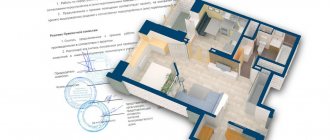What it is?
Features of the redevelopment are reflected in Chapter. 4 LCD RF. According to the code, redevelopment is considered to be any work to adjust the structure of a non-residential property, its area and size.
Redevelopment can include:
changing the size of windows and doorways in the room (reducing or enlarging, changing shape) or sealing them;- eliminating small rooms by combining them into a spacious room;
- adjusting the size of small rooms within the facility.
The main goal of the redevelopment is to change the internal content of the premises so that its qualities are significantly improved and are suitable for subsequent commercial or other activities. It is important to consider that the new premises must not only meet the functional requirements of the company, but also not contradict the legislation of the Russian Federation.
ATTENTION : The main principle of redevelopment is change within the premises. Changing the appearance of a building is not considered redevelopment.
When carrying out work, load-bearing walls cannot be used . In addition, after the changes have been made, the layout of the general communications of the premises should not change.
Redevelopment of non-residential premises: what needs to be formalized?
The implementation of a redevelopment project usually has a single goal - creating better indoor conditions for conducting commercial activities.
This procedure, in the implementation of which the BTI (technical inventory bureau) participates, provides for changes in the configuration of the entire room, changes in the number or area of rooms, the creation of rooms using solid partitions, as well as a general change in the area of the entire room.
According to the laws of the Russian Federation, approval for the redevelopment of non-residential premises is required in the following cases:
- Changing the location of sanitary facilities, for example, when it is necessary to move a sink or toilet to another corner of the room.
- Installation of dividing walls that exert a certain pressure on the overall supporting frame of the building.
- Changing the configuration of window openings, most often by reducing or enlarging them, as well as installing old ones or creating new ones.
- A change in the floor covering, which directly affects its design, because such an action often refers to a change in the load-bearing parts of the building.
- Installation of equipment that requires additional communications: cabins with showers, gas stoves or sinks.
- Adding additional elements, such as a loggia or staircase, or changing their configurations also requires approval of the redevelopment of non-residential premises.
- Any changes in stairwells are a procedure that requires official permission from the BTI.
- Additional connection of communications without permission may result in a fine.
All actions described above require a legalization process from the housing bureau or other local government authorities.
Redevelopment of non-residential premises is not always required. In some cases, modern legislation provides for the possibility of changes in a non-residential building without the need for a preliminary technical inventory and registration through the BTI authorities.
If you ignore this point, there is a danger of receiving a ban on the operation of the illegally modified premises, as well as an impressive fine.
The following changes are not approved:
We recommend that you read:
Redevelopment project
- dismantling of any interior parts and furniture that belongs to the built-in range;
- any external decoration that does not affect the property as a whole, in particular its supporting structures;
- change of communication type equipment, with the new technical equipment being similar to the previous one.
Before you begin redevelopment, you should determine what type it is.
What's the difference with rebuilding?
Art. talks about the reconstruction of non-residential objects. 25 Housing Code of the Russian Federation.
The article says that the following types of work include reconstruction :
Adjustment of communication networks - their replacement, transfer or installation.- Installation of water drainage, sewerage, heating systems, electrical equipment.
- Installation of toilets, baths, kitchens.
The main difference from redevelopment is that redevelopment is aimed at replacing or adjusting engineering and technical systems - something that is not visible at first glance. Redevelopment is still based on changing the appearance of the room and its overall structure.
Difference in procedure in an apartment building and another building
The cost of the work carried out and the procedure for registering redevelopment depend on the location of the non-residential premises:
| In a non-residential building | In an apartment building |
| Reconstruction and major repairs are not coordinated with the administration, but it is necessary to correctly qualify the extent of the work performed so as not to make illegal changes to the building plan. It is easier to obtain permission for placement in a non-residential building. | Before starting work, it is required to hold a meeting of residents, where neighboring owners must agree to make changes and make sure that the redevelopment will not disrupt the layout of their apartments. |
Learn about the important legal nuances of reconstruction and redevelopment of non-residential premises in an apartment building and a non-residential building.
When should it be done?
Redevelopment of a commercial premises can be justified by many factors, the main ones being :
- Expansion of the company's staff, which requires additional work space or delimitation of areas.
- Reorganization of the enterprise, changing the goals of production activities.
- The need to create convenience and optimize the workflow.
As for documentation, it does not differ depending on the functional purpose of the premises, be it a warehouse, retail space or office.
In what cases is a permit required and is it required in an apartment building?
Redevelopment is a complex, time-consuming process, so it is important to ensure the legality of the procedure at the initial stage. Otherwise, the entrepreneur cannot avoid litigation, which will require the premises to be returned to their original condition. It is necessary to know which types of redevelopment require confirmation of legality. This list includes :
actions performed in relation to the load-bearing floors of the room, creating additional load on the walls - replacing the flooring or screeding it;- creating a new entrance to the premises or correcting an existing one;
- installation of internal stairs, additional upper floors, attics;
- carrying out work on redevelopment of attic spaces;
- transfer, installation or dismantling of loggias, balconies, window openings;
- dismantling or moving plumbing (or special) equipment.
The legislation provides only for the main factors that require approval from the BTI. But you need to keep in mind that for any structural changes in a non-residential premises it is better to consult a specialist. This is especially true if you plan to work in an apartment building.
Duration and cost of the procedure
The cost of documents will depend on several factors:
- where the NP is located, in an apartment in an apartment building or in a separate building;
- types of construction work that were carried out;
- region of the Russian Federation and locality, it matters whether it is a regional center or a small town;
- others.
So, on average, the owner will have to pay for:
- technical report 6 thousand rubles. and more;
- project - 15-35 thousand rubles;
- certificate of completed redevelopment - 15 thousand rubles. and more;
- entering new information into documents stored in the BTI - 2 thousand rubles. and more expensive.
If changes have been made to the facade of the building, this will significantly increase the cost. For example, it will be possible to legalize the redevelopment of non-residential premises and obtain final permission if a separate entrance has been cut through, for an average of 60 thousand rubles.
Obtaining each document when legitimizing the redevelopment of an NP is associated with different deadlines, for example:
- an application submitted to the Housing Inspectorate is considered within 3 months;
- MVK permit is issued within a month;
- court decision on legalization, if necessary, - 2 months.
Unauthorized conduct without the consent of the BTI and responsibility for it
IMPORTANT : Legal redevelopment is accompanied by a permit issued by territorial authorities. Work that is not coordinated with them is assigned the term “unauthorized redevelopment.”
Housing department employees are loyal to isolated objects , so it is mainly used in relation to premises located in a residential building.
The basis for issuing a permit for redevelopment is the approval of the project, which specifies the technical features and sanitary standards corresponding to the facility. If they do not contradict the law, the project is approved. Since compliance with these standards is very important, because it brings safety not only to the owner of the premises, but also to his neighbors, failure to comply with them is punishable.
Illegal redevelopment of premises is recognized as an administrative offense and is subject to a fine in accordance with paragraph 2 of Article 7.21 of the Code of Administrative Offenses of the Russian Federation.
The owner must pay the compensation. The amount of the fine depends on what status it is in :
- an individual pays up to 2,500 rubles;
- legal entity – from 350 thousand rubles. up to 1 million rubles
In addition, the owner is obliged to return the premises to its former form at his own expense. If the person refuses this, the court may decide to sell the premises. The amount received from the sale is given to the owner minus the funds spent on the execution of the court decision. Now the new owner will be obliged to return the premises to the condition before the redevelopment.
In particularly difficult situations, criminal liability may be imposed - for example, in cases where illegal redevelopment endangered human health and life. Then the court decides what punishment the owner deserves.
Watch a video about fines for illegal redevelopment:
What is illegal redevelopment of an apartment and its signs
When planning work in residential and non-residential premises of an apartment building, you need to order a project and confirm the safety of changes to the object for the building. The conditions for the safe conduct of redevelopment work are checked during approvals from the Moscow Housing Inspectorate (Moszhilinspektsiya). This department will also check the compliance of the completed work with the project and legislative norms. The rules for design and approvals for these types of work are regulated by the Housing Code of the Russian Federation and regional regulations.
Responsibility for illegal redevelopment of non-residential premises occurs when the following violations are detected:
- if work was carried out without the consent of the owner of the premises (for example, if it was done by tenants or tenants);
- if the required documents were not drawn up for the work (in Moscow this is not only a project, but also a technical report on load-bearing structures);
- if the project documentation was not approved by the Moscow Housing Institute, or the inspection made a refusal decision;
- if during the work, deviations from the project were made, building codes, fire and other safety rules were violated.
These rules apply not only to apartments, but also to non-residential premises of apartment buildings. For example, if an individual entrepreneur illegally remodeled the basement of a residential building, converted it for hazardous production, or created a threat to the safety of the building, he will be fined and forced to return the premises to their original (original) state.
Expert commentary. A fine for illegal redevelopment of an apartment may be collected even if you bought the property with unapproved changes. Responsibility under the Code of Administrative Offenses of the Russian Federation lies with the current copyright holder of the apartment, and it is extremely difficult to make claims against the seller. To avoid such problems, carefully check the technical documents when purchasing an apartment, compare them with the actual state of the structures and equipment of the premises. We recommend paying special attention to the red lines on the floor plans of the BTI technical passport.
If the redevelopment is carried out in violation of building codes, it will be impossible to legitimize it even through the court. For example, this applies to the demolition of load-bearing walls inside an apartment.
Procedure
An entrepreneur wishing to redevelop a commercial premises must go through the following steps:
- It is important that the owner has the following documents in hand before redevelopment::
- technical certificate of the premises;
diagrams of premises located above and below the object being modified;
- certificate on the condition of structures between floors and load-bearing walls;
- certificate of location of engineering systems in the premises.
An application is being prepared to the BTI about the desire to carry out redevelopment, indicating the reasons . If the application is approved, the project is prepared. The finished project is agreed upon with the territorial commission. If it has been approved, the owner enters into an agreement with a specialized technical control company and implements his plan.- After completion of construction work, the site is inspected by a commission that checks the compliance of the redevelopment with the approved plan. If everything is in order, an act of approval for putting the premises into operation is signed. The owner must issue a cadastral passport reflecting the new changes. After receiving the technical documents, the certificate of ownership is reissued with new data.
If the redevelopment affects the load-bearing walls - it is planned to install openings, windows, install air conditioners - an additional inspection is required by a specialized organization that will approve or prohibit work on the main walls.
Watch a video about approving the redevelopment of non-residential premises:
How to legitimize actions?
Administrative approval for the redevelopment of non-residential premises is carried out in accordance with the requirements of the residential complex (Federal Law No. 188) in several stages:
- Preparation of the project (what is a redevelopment project, what does it consist of and what is it needed for?).
- Preparation of technical documentation.
- Contacting government agencies and obtaining consent to work.
- Carrying out repair work.
- Receiving a certificate from the admissions committee.
- Inspection of the property by a cadastral engineer.
- Registration of changes in cadastral registration.
Where to apply for permission?
Making a project requires careful preparation and knowledge; you can do it yourself by visiting the following authorities:
- Rospotrebnadzor;
- fire supervision;
- Committee on Urban Planning and Architecture;
- Committee for the Protection of Architectural Monuments (if required);
- housing inspection.
You can also entrust documentary planning to a private real estate company, which will help with the design of the project. Each authority reviews the applicant’s request and documents and issues a general conclusion. The voting results can be recorded in a free-form protocol.
We talked more about the procedure for obtaining permission to redevelop non-residential premises in this material.
What documents should I provide?
After receiving the project, the owner applies to the urban planning department of the municipality of the locality with the following documents:
- statement;
- passport of the applicant (owner or authorized representative) or constituent documents for legal entities;
- design documentation;
- certificate of ownership;
- technical passport of the building/premises;
- conclusion of regulatory authorities.
After receiving permission, the owner has the right to carry out planned construction work and redevelopment in accordance with the design and technical conclusion, while it is prohibited to deviate from the requirements specified in the documents.
The work is checked and accepted by a cadastral engineer, who records changes in the technical passport. To call a specialist after construction is completed, contact the BTI. If no deviations from the project requirements are found, a report on hidden work and a report on completed redevelopment are drawn up.
With the received act, the owner applies to the final authority - Rosreestr, where the property is cadastrally registered or changes are registered in the register. From this moment on, the redevelopment is considered legal. The owner of the non-residential premises is given an extract from the Unified State Register of Real Estate.
Deadlines
The current legislation establishes the time frame for consideration of an application:
- approval will take 1 month;
- for final registration - 3 months.
Price
The cost of legalizing redevelopment depends on the following factors:
- region of location of the immovable property;
- square footage of the room;
- type of redevelopment;
- calling specialists;
- contacting a lawyer.
On average, by region for redevelopment (documentary approval) you will have to pay the following amounts:
- purchase of a standard project – 15,000-30,000 rubles;
- purchase of an individual project – up to 150,000 rubles;
- approval – 30,000 rubles;
- for each document 2000 rubles.
Institutions involved in the approval process
The owner will have to communicate with several authorities to coordinate the project. This:
- City administration and bodies that control urban planning : get involved if the redevelopment is in the nature of reconstruction. Authorities must issue permission for major alterations.
- Bureau of Technical Inventory (BTI) : reviews the project, inspects the finished premises, issues a technical certificate after approval of the changes. The specialist also draws up a technical description of the work performed.
- Office of the Federal State Service for Registration, Cadastre and Cartography : registers the work performed after the owner submits a complete package of documents.
An opinion from the sanitary and epidemiological service may also be required - in cases where the changes affected plumbing units.
On average, the approval period for construction can take up to 2 months . The cost of approval depends on the scale and complexity of the changes being carried out; it can range from 80,000 to 180,000 rubles.
TIP : If work takes place in a room located in a residential building, you must initially transfer it from residential to non-residential.
Documents for registration
Statement
Compiled personally by the owner. The application contains a general list of planned changes, as well as a description of the reasons.
Project
A document drawn up by the owner of the premises. The project includes :
- general description of the future premises - architectural stage;
- layout of utility networks - places where electrical wires, drainage and heat systems will be laid;
- location of entrances, windows and internal doors.
Permission
Issued after review of the project by the inspectorate, and contains:
a complete list of changes that were approved by the commission;- the planned duration of the work;
- a note about the mandatory report after repairs;
- validity period of the permit - if the work has not been carried out by the end of the permit, it is required to obtain it again.
The permit is certified by the signature and seal of the head of the supervision inspection.
Act
Signed upon completion of repair work, and must contain:
- confirmation of compliance of the work performed with the plan and issued permit;
- guarantee of access to all utility networks;
- confirmation of the correctness of the hidden work carried out (if any);
- the fact that there is a journal on the control of work performed.
The inspection and signing of the act takes place in the presence of the owner of the premises, as well as representatives of the homeowners association, the organization monitoring the condition of the facility, the fire service and the construction organization that carried out the repairs. The document is drawn up in 3 copies: for the owner, for the BTI and for the housing inspection.
Technical conclusion
Issued after a thorough inspection of the facility, and contains information about the technical condition of the structure and its elements, heat supply systems and electrical systems, and the quality of materials used in repair and construction. Information about the condition of floors, load-bearing walls and foundations is also entered. It is compiled to confirm the safety of the structure during operation .
What are the dangers of illegal apartment redevelopment?
To find out what the consequences of remodeling an apartment without approval are, you need to refer to the norms of the Code of Administrative Offenses of the Russian Federation. However, a fine for remodeling an apartment without permission is not the only sanction for the copyright holder. If he cannot confirm that the completed work does not threaten the reliability and stability of the building, the Ministry of Housing and Construction will issue an order to restore the object to its original condition. All expenses for such will be borne by the offender. If you do not comply with the order, a corresponding lawsuit will be filed in court.
Fine for illegal redevelopment under the Code of Administrative Offenses of the Russian Federation
Let's look at the consequences of illegal redevelopment of an apartment according to the law. This offense is described in Article 7.21 of the Code of Administrative Offenses of the Russian Federation. Changes were made to this norm in April 2020. Now the wording of Art. 7.21 of the Code of Administrative Offenses is as follows:
- unauthorized reconstruction and redevelopment of residential premises entails a fine for citizens from 2000 to 2500 rubles;
- if the violation is committed by an official, he will be fined in the amount of 4,000 to 5,000 rubles;
- The fine for redevelopment without permission for an organization will be from 40,000 to 50,000 rubles.
- For violations committed by an individual entrepreneur, the same fine is collected as for a legal entity. faces.
A protocol is drawn up to submit materials for collection of a fine. It will describe the elements of the offense, information about the owner and the object. Please note that paying a fine does not relieve you of the obligation to legitimize the work performed or to restore the object to its original condition.
If the redevelopment was carried out without approvals, but did not entail violations in the construction sector, it can be legalized through the Ministry of Housing and Construction.
Regional fines
Regions can also introduce fines for violating the rules for carrying out work in residential and non-residential buildings. Since the fine for remodeling an apartment is approved at the federal level, regions can hold liable:
- for violation of work rules;
- for damage, damage or destruction of an object;
- for failure to comply with the instructions of the housing inspectorate and other supervisory authorities.
The Moscow Law on Administrative Offenses provides for a fine of 4,000 rubles. for damage to residential premises in an apartment building. In addition to a fine, the violator will be required to compensate or eliminate the damage caused. To compensate for damage or compel the alteration of the premises, a separate claim is filed in civil court.
| No. | Documents used when approving redevelopment | Description |
| 1 | Title document | Only the owner can carry out redevelopment. The title document can be an extract from the Unified State Register of Real Estate, a certificate of title |
| 2 | Owners' consent | The consent of all owners of the premises is required for redevelopment. Consent must be formalized in writing and submitted for approval. |
| 3 | Redevelopment project | The project contains a description of all redevelopment work and requirements for their safety. The project can be produced by an organization consisting of SRO designers. |
| 4 | Technical conclusion | The technical report describes the condition of the load-bearing structures for redevelopment. Based on the results of the inspections, the technical report draws a conclusion about the admissibility of the work, and draws up calculations for loads and structural reinforcements. |
| 5 | Acceptance committee report | The act is drawn up in the Moscow Housing Inspectorate after completion of the work. Specialists will check that redevelopment solutions comply with the project and technical conclusion. |
| 6 | Technical plan. | The main document on the basis of which the object is placed on cadastral registration with information entered into the Unified State Register of Real Estate. After redevelopment, the technical plan indicates the new characteristics of the room. The technical plan is prepared by a cadastral engineer after examining the building. |
An example is illegal redevelopment associated with expanding the area of an apartment beyond the overall dimensions of an apartment building. Such work is prohibited, so legalization will end in refusal.
Consequences of illegal redevelopment in non-residential buildings
In non-residential buildings, redevelopment work does not need to be coordinated. More precisely, this procedure does not involve contacting the Ministry of Housing, although the owner will still have to order a technical plan and register the changes in Rosreestr. But the customer approves the project for the work himself, after which he can begin redevelopment.
Taking into account the rules set out above, there is no penalty for illegal redevelopment of non-residential premises in a non-residential building. The owner can be cited only for violating safety during work, for damaging someone else’s property, or causing harm to people.
- Expert commentary. If the redevelopment is not legalized, consequences occur only when violations are revealed. Finding out what the repairs were in someone else's apartment is quite difficult. Therefore, many facts of illegal work are not revealed. However, discrepancies in the configuration of the premises will certainly be identified when transactions are completed. This will be grounds for refusal to register the agreement.
How to submit documents for registration?
The owner or his representative can submit documents for registration in person (with the execution of a power of attorney from a notary). In addition, it is possible to send documents by mail. Perhaps the fastest way is considered to be a more modern method of sending - submitting an application on the State Services portal.
ATTENTION : The application is filled out online and reviewed by the commission; after approval, a letter with a coupon is sent to the applicant’s email. The owner comes with the original documents on the appointed day and time to obtain permission.
What to do if approval is not received?
If the BTI does not approve the redevelopment project, it is necessary to obtain justification from the authority . In cases where the grounds for refusal are correctable, we correct the errors and send the application again (for example, we transfer the premises from residential to non-residential, etc.). If the refusal seems unreasonable to the owner, but redevelopment is still needed, he will have to go to court.
Coordination of a redevelopment project is a labor-intensive procedure, so it will not be easy to go through it on your own. In addition, each region of Russia has its own rules for registering redevelopment. We recommend contacting specialists who will help prepare documents and carry out the entire procedure for you.







